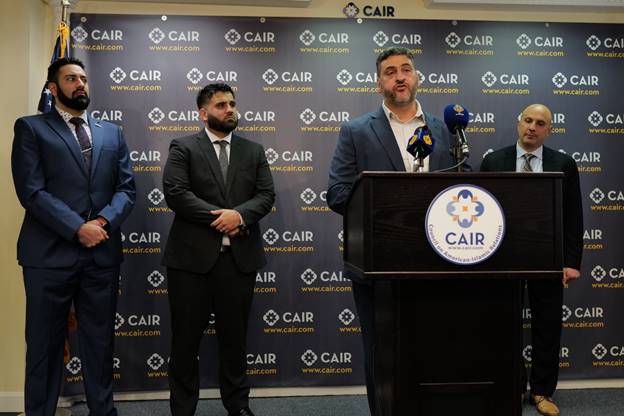

CAIR Sues FBI for Gaza Activists’ Constitutional Violations
Report and photo by Phil Pasquini

Washington: The Council on American-Islamic Relations (CAIR) held two press conferences on August 12, in Washington, DC and Los Angeles in introducing a lawsuit on behalf of two United States citizens of Palestinian descent who have been placed on the secret No-Fly list claiming they were added for political reasons.
The 68-page lawsuit lists 29 defendants in the federal government that reads like a Who’s Who of top officials at the CIA, FBI, Justice Department, Secret Service, National Intelligence, Homeland Security, Transportation Agency, Immigration and Customs Enforcement, the Secretary of State, Financial Crimes, Cyber Command and the Department of Defense.
The two plaintiffs, Dr Osama Abu Irshaid and Mustafa Zeidan, have never been charged or convicted of a crime, yet the suit alleges that due to their activism in seeking an end to the war in Gaza, they ended up on the list.
The lawsuit, the first of its kind, challenges the FBI’s targeting of “innocent people who speak up for Palestine and criticize Israel’s violence in Gaza.” They went on to say that “CAIR is challenging the mistreatment of these Palestinian-American activists on constitutional grounds.”
The lawsuit is based on “Palestinian-Americans on the No-Fly List and the seizing of an electronic device, while interrogating both about their lawful organizing against Israel’s genocide in Gaza.”
In addressing the lawsuit Plaintiff Abu Irshaid, a former journalist, spoke briefly at the press conference saying in part he came to the US because what appealed to him was the “constitutional rights and civil liberties that guarantee human dignity. As a journalist, I appreciated the freedom of expression, the right of political dissent and the rule of law and equality it afforded.”
He went on to say that he appreciated “that neither Congress nor the government can enact laws that violate constitutional articles and that security agencies have no right to infringe on people’s rights under flimsy pretext without judicial permission and due process.”
He believes that he was specifically targeted for his activism as the executive director of the group, American Muslims for Palestine. As a result of his activism the lawsuit asserts that he was placed on the No-Fly list.
Abu Irshaid has been subjected to enhanced security when he arrives at the airport which includes secondary screening when boarding by being pulled aside in full public view.
Upon returning to the US, he has had his cell phone confiscated repeatedly and in one instance when he inquired when it would be returned was told it would be “returned later.” To date, it has not been returned.
This has prompted him to take two courses of action. He now only travels with a “clean cell phone” and travels separately from his family on a different flight so as not to subject them to the humiliating and degrading treatment and delays he experiences.
When departing from London a British airport security official told him he would be better off “changing his name.”
The second plaintiff, Palestinian-American Mustafa Zeidan, who formerly traveled regularly to Jordan to help his ailing elderly mother, had never experienced any delays when departing the US or upon his return. He has discovered since October 8, when he began holding frequent pro-Palestinian demonstrations and protests along with anti-genocide actions in his community, that his activism may have landed him on the No-Fly list.
In the aftermath of his activism when he tried to board his flight at Los Angeles International Airport (LAX) for Amman, he was barred from doing so without explanation. When he inquired why, a TSA agent told him to file a “DHS TRIP inquiry form.”
He did so and later received a written response that indicated “he had been identified ‘as an individual who may be a threat to civil aviation or national security.’ ”
This latest lawsuit is only one of many filed by CAIR since 2001 on behalf of Muslim Americans who have been subjected to enhanced security and secondary screening at airports. including having had their electronic devices taken from them and not returned or have been added to the No-Fly list and/or removed without notice or have been barred from travel without explanation.
The list in 2019 contained 350,000 entries of individual names, of which a review revealed that 98.3 percent were Muslim.
Regarding the issue of cell phone and electronic devices being confiscated by authorities, the US Court of Appeals in Washington late last week released its ruling on the retention by police of an arrestee’s personal electronic possessions for an indefinite period.
The ruling said that the practice of police holding confiscated personal property for an indefinite time violates the Fourth Amendment of unreasonable search and seizure.
The decision was based on a case stemming from 2020 of those arrested during a racial justice protest when Washington Metro Police confiscated cell phones and electronic devices of protesters including the camera of a journalist, and holding their personal property for a year before they were returned.
The court found that “…property is subject to the same constitutional protections against indefinite police detention as people.” The final decision, however, as to this matter will be decided by the Supreme Court at some future date.
(Phil Pasquini is a freelance journalist and photographer. His reports and photographs appear in the Washington Report on Middle East Affairs, Countercurrents, and Nuze.Ink. He is the author of Domes, Arches and Minarets: A History of Islamic-Inspired Buildings in America.)

